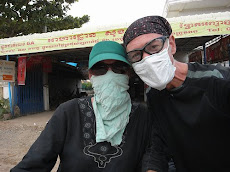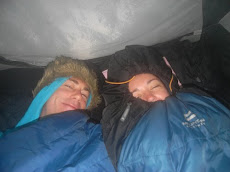We did say that we found the Iranian people to be incredibly friendly, helpful and welcoming. On two seperate occasions in Tehran were were trying to find out where to catch a bus and not only did total strangers walk us several hundred metres to the right bus stop but they paid for our fare as well - and they weren't even getting on the bus - can you imagine that happening in many other capital cities in the world?
We also said that Iran has an amazing history of civilization with fantastic old cities, ruins and artifacts and beautiful architecture and buildings from a succession of dynasties: from the Achaemenids, Parthians and Sassinians, to the Arabs, Turks, Seljuks, Timurids and Safavids and finally the Shah's of the Qajars and Pahlavis. Some of these places are wonderfully atmospheric and it easy to imagine how things must once have been - the Shah being cooled by a breeze as he looks out over Imam Square from the Ali Qapu Palace or a remote desert caravansary bustling with hundreds of camels and robed silk route traders.

What we didn't say was that we found Iran to be a bit dull. I understood that Iran was a theocracy but until we arrived I hadn't quite realised this meant that it was a totalitarian state (you have to be slightly suspicious about any country that has national holidays called "Heart-Rending Departure of the Great Leader of the Islamic Republic of Iran" and "Magnificent Victory of the Islamic Revolution of Iran"). "We are not free" was something we were told countless times - and its true - Iranians are not allowed to dance (except at weddings), women are not allowed to sing (this is good in that you don't have to hear Britney Spears songs), there are no bars or clubs and few cafes or restaurants and no "streetscene", cinemas in regional centres close at 9pm, hip-hop is banned as is having a boyfriend/girlfriend, there is not freedom of the press, speech, expression or dress (women have to wear the hijab but outside Tehran the majority wear the chador). To the outsider the 1979 revolution looks like an anti fun crusade and Mr Grumpy's (aka Ayatolla Khomeni) stern frowning face looks down upon the masses from huge murals everywhere. Unfortunately modern Iran has not the exoticism of its past.

Iranians assured us that there is dancing and drinking and merrymaking but as this is banned it takes place in people's homes - to what extent we could not say but either way, as an outsider its very difficult to access. It is a strange and at times fascinating society - we saw teenage girls wear fake hair which they can "show" because its not their real hair, like school children testing the boundaries of school rules. Young people have secret boyfriends/ girlfriends. Satellite TV is banned but many households have it - like the rest of the world they watch American movies, football and porn, whilst the government controlled TV channels spew out anti USA/Israel and pro-Iran propoganda, religious programmes and football. Its hard not to conclude that many Iranians just want to live their lives like elsewhere.
Unsurprisingly there is widespread dissatisfaction with the Ayatollahs revolution, the majority we spoke to wanted a change. Our sample was biased towards english speakers and younger people but walking along the street one day an elderly man attempted to strike up conversation; it was difficult to understand exactly what he was saying but the gist was clear "Khomeni was an asshole who had ruined Iran.". Though I am sure if we had gone to religous cities such as Qom or Mashad we may have heard a different story. Interestingly people mainly spoke to us about wanting to leave the country rather than fighting for change.
The division of men and women in Iran does have interesting consequences for the visitor. City buses are segregated - men at the front, women at the back - and on fully rammed rushhour buses its not always possible to see your partner, which is fine if you both know where to get off but not if you don't - Tracey had to keep getting off and on the buses when they stopped to see if I had got off! There are women only carriages on the Tehran underground but this is to allow women to escape the wandering hands of sexually deprived men from groping them in the rush hour scrum (women are allowed on other carriages if they want).

Unmarried men and women are not allowed to socialise which results in gangs of "frustrated" young men hanging about all over the place. In non muslim societies this would result in carnage of epic proportions. It is a credit to their religion and society that in Iran it does not - but that is not to say that having the streets full of Beavis & Butthead stereotypes is a good thing.
The lot of women in muslim countries is well documented. We found Iranian women to be confident, well educated (65% of university students are women - though only 20% get jobs) and have the freedom to be out and about in the public realm, drive cars and have (limited) jobs - which is more than can be said for neighbouring parts of Pakistan and Turkey and came as something of a suprise. Tracey met a young woman on the train from Tabriz. She was studying for a Masters Degree but had no plans to ever work, she came from a well-off family and was supported by her father, she was engaged and once married would be supported by her husband while she raised a family - Tracey thought it seemed like a pretty good life. But on the other hand Iranian women are expected to be housewives and it is hard not to feel that their lives and freedoms are restricted by what seem to us fairly spurious rules and social taboos (eg women are not expected to ride bicycles) made up by men and the injustice inherent in this grates against what we feel to be right - even if many Iranian women lead very happy and fulfilling lives.
We left hoping that the old adage "after the revolution comes the revolution" rings true for Iran - it would then be a fantastic place to visit.













No comments:
Post a Comment